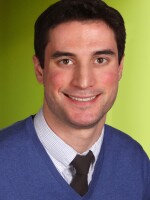Two Syracuse University geology professors - along with a graduate assistant or two - are hurrying to collect water samples from drinking wells in the Southern Tier before - and if - the natural gas extraction method known as hydraulic fracturing is approved in New York.
Greg Hoke and Laura Lautz will use the samples to create a baseline database of drinking water quality in the region. The effort is being called Project SWIFT, for shale-water interaction forensic tools.
They have been collecting samples all summer and the results will soon be available online."You'll be able to go and search ‘what does sodium concentration look like in Southern Tier drinking water?’" Hoke says. "You name the element and we’ll probably have it. The common ones will certainly be up there."
Hydraulic fracturing - or fracking - requires massive amounts of water pumped into shale formations to release natural gas. Once that water is used, it is contaminated with salt, chemicals and radioactive materials.
Landowners in states where fracking is already allowed have alleged their drinking wells have become contaminated from nearby drilling operations. The gas industry denies the claims and says they're unfounded - though the EPA and U.S. Geological Survey have released reports that link the two in a shale formation in Wyoming. Again, industry disputes the methodology of these studies.
The hope of Project SWIFT, Hoke and Lautz say, is to create a baseline so landowners can compare pre- and post-drilling water samples and have access to the database if they believe contamination has occurred.
"We'll be able to anticipate 'okay, if your well is contaminated with a product of hydraulic fracturing,' we should be able to go to that homeowner's well, collect the water sample, and look for those identifiers," Lautz explains. "And be able to tell them the likelihood of whether the contaminate they're concerned about is something related to hydraulic fracturing or something else."
Project SWIFT will be a non-partisan source of information, the co-founders say.
"[Fracking] was just in the news and in the news. And walking into the office one day I was like ' wait, we have the people in this building that can answer this question [of water quality],'" Hoke says.
Right now the project is funded only by Syracuse University, but they have applied for federal funding.
Fracking has been on hold in New York for more than four years as the state conducts an environmental review of the process. The decision looks to have been pushed further out because of the need for the state to complete a health impact study, partly to mitigate against potential future litigation.
You can follow reporter Ryan Delaney on Twitter @RyanWRVO





